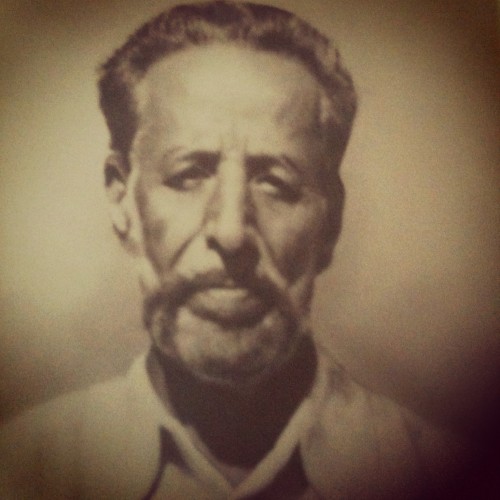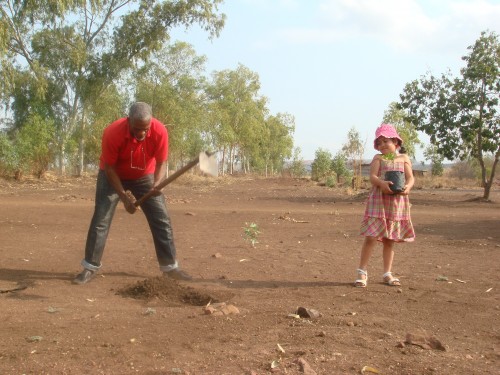
Anna had renounced her Christian faith to convert to Islam. She even learnt to cook curries to satisfy her husband’s palate. She also bore him seven children, most of whom – for reasons we shall never know – her husband Jahandad sent back to Pakistan, before departing for the homeland himself. Their youngest was Sarandaz, my aunt’s father, born in 1921. Since he was still being breastfed, he remained in Mozambique with his mother. That’s where he grew up, among the magnificent tea plantations of Zambezia province, while his siblings (the eldest of whom was mum’s father) grew up across the Indian Ocean in their father’s ancestral village of Nila in Pakistan.
When Sarandaz was old enough, Anna arranged his marriage with a young hard working girl she had taken a shine to. It was Anna that delivered her first grandchild, a girl. She named her Aissa after the daughter she had lost to Pakistan. Anna passed away when her granddaughter was just seven, still too young to articulate the questions about her family history that she would later want answers to.
Aissa now explained to her fascinated colleague that all contact between the African and Asian branches had tragically long been lost. “I don’t know any of that side of the family,” Aissa confessed. “I don’t even have a proper address – just the name of the village and district.” Her colleague was shortly returning home to Pakistan, so she persuaded Aissa to write a letter to her family, promising to post it on her behalf.
Aissa wrote a note, handing it to her colleague along with the vague address she had, and then forgot about it: “My name is Aissa Khan. I am the eldest daughter of Sarandaz Khan and granddaughter of Jahandad Khan. My father passed away in 1971 at the age of fifty. I am the eldest of seven siblings here in Mozambique. I work for the World Health Organisation. I have a good job and the means to make a trip to Pakistan. If anyone from the family wants to get in touch, we would love to hear from you.”
The recipient of that fateful letter was Aissa’s namesake, Sarandaz’s older sister; although she spelled her name the Pakistani way – Aisha. People say the lady carried that letter around in her bosom for months, proudly showing it off to anyone that would listen, that her niece had sent word from her birthplace. People also say she never forgot the roar of the mighty Zambezi River where she spent her earliest years, before she was cruelly separated from her mother as a young girl, albeit lovingly raised by her father’s parents.
The proud aunt forwarded her niece’s photocopied letter to every branch of the family she could contact – it went to Islamabad, Lahore, Karachi, Mumbai, London – even mum received a copy in Bradford. That’s probably when I came to know mum had first cousins in Africa.
Just a few years after writing that auspicious note, Aissa learnt that her namesake in Pakistan was critically ill. So she determined to travel from Mozambique urgently, in order to meet the aunt she had been named after. Alas, she arrived a fortnight too late.
Knowing how close mum’s father was to his siblings, and knowing how close mum subsequently is to her cousins in Pakistan, it was only a matter of time before mum set off to meet the Mozambique branch. I was lucky enough to accompany her when she finally made the trip last month.
It was quite a reunion. Aissa, clearly the matriarch, was at the airport to greet us with a warm embrace. She had brought her sister Ameena and her brother Sultan who not only bears an uncanny resemblance to my mum but also bears her father’s name. As if that wasn’t enough, his son is also Sultan. I called my uncle ‘mamoon’ as I do mum’s own brother because that’s the specific Urdu word reserved for addressing your mum’s brother. Likewise, my new-found aunties I called ‘khala’ which means mum’s sister.
Later that evening, we were invited to a reception held in our honour on the rooftop of Khala Eva’s Maputo apartment. There were so many people waiting to meet us, so many smiles to acknowledge, so many names to remember. If the number of people – aunts, cousins and their children – wasn’t overwhelming, then the selection of food temptingly laid out on the trestle tables definitely was. After a few hours, I asked each khala and mamoon in turn to sit for a photograph with their entire branch – spouse, children and grandchildren – partly because I wanted to record the moment, but also because it helped me to work out who was who.
There was a lot of catching up to do. Khala Aissa recounted how her colleague had prompted her to make contact with the Pakistan branch all those years ago. But despite her visit to Pakistan, none of the siblings had seen a photograph of their grandfather, Jahandad Khan. Mum in turn had never seen a photograph of her youngest uncle, Sarandaz Khan. Mum didn’t know about her youngest aunt, Noor Begum, either, who had also grown up in Mozambique with her mother but sadly died very young. Such was the close bond between the siblings that Sarandaz raised his sister’s two young children like his own after her untimely demise.
Nor did mum know that her father, Sultan Mehmood, wasn’t the first born. In fact, he had an older brother, Varsi Khan. Unbelievable as it sounds, Varsi died mercilessly at the hands of a crocodile whilst travelling on a small boat from Zambezia, as the siblings made their way to the port of Beira to commence their life changing journey to Pakistan. Mum could barely imagine the ordeal which compelled her father never to speak of it.
I suppose it’s only natural when you come face to face with long lost relatives that you look for a family resemblance. I noticed almost immediately that mum had exactly the same nose as her cousins. There were many expressions too which seemed familiar and many a smile I recognised. There was even a baby, my cousin Graca’s daughter, who was the spitting image of me when I was that age.
There were differences too – cultural, religious, and even linguistic. They spoke Senna or Portuguese while we talked in Urdu, using English as the common language to communicate between the two branches. And yet, as we got to know the women, we seemed alike in so many ways – not just strong, independent and ambitious but also unassuming, open and trusting. Mum and her cousins shared their ‘sukh dukh’ (joys and sorrows) as if they had always been a part of each other’s lives.
Many of my cousins, I noticed, seemed to be blessed with a creative streak – making jewellery, hair accessories, even customising flip flops with beads to sell to friends. If I didn’t know better, I’d have thought they had taken a master class with my mum’s artistic aunt, Nighat Parveen, from the Pakistani branch. And Khala Ameena, who missed out on a formal education, was nevertheless a skilled machinist. “Show her any design you like and she’ll replicate it within the hour,” her sister explained to mum, who in turn remarked that she is known for precisely the same talent!
A clear highlight was our visit to Khala Aissa’s farm or ‘quinta’, an hour’s dusty drive from Maputo. Sultan Mamoon drove us there, stopping first to pick up halal piri piri chicken for us to share on the veranda. We stopped again, this time to buy saplings because Khala Aissa wanted us to plant trees. The saplings cost pennies and there was quite a selection to choose from, even from the young lad’s makeshift stall on the roadside. I picked avocado, mum chose a mango sapling and my daughter selected a lemon plant. As Sultan Mamoon dug the rich red soil beneath the burning African sun, my thoughts turned to new beginnings. I sincerely shared Khala Aissa’s sentiment that we would one day return, to the land of our forefathers, to harvest fruit from the young roots we were leaving behind.

You may also like to read the first part of this blog, Retracing the Footsteps of my African Great Grandmother, written just before the trip to Mozambique.
Irna Qureshi blogs about being British, Pakistani, Muslim and female in Bradford, against a backdrop of classic Indian films.
Brilliant real life story… I’d love to see photos from your generations and hope this will one day become a book! Great stuff. 🙂
wonderful write-up, many thanks
I am so glad that you chose to write this chronicle about OUR lineage Irna Dee, I am extremely grateful…
I wish that I can too soon visit Mozambique and experience the emotions, and create new memories…